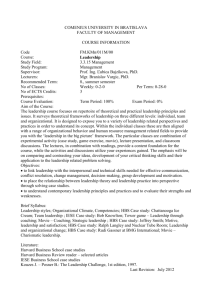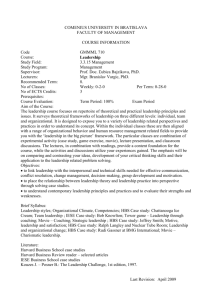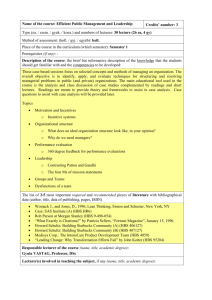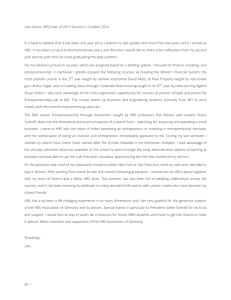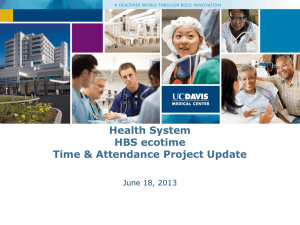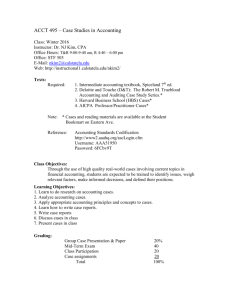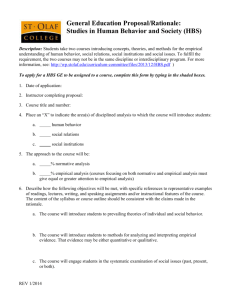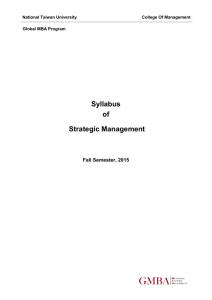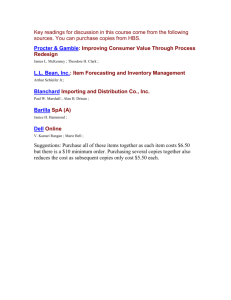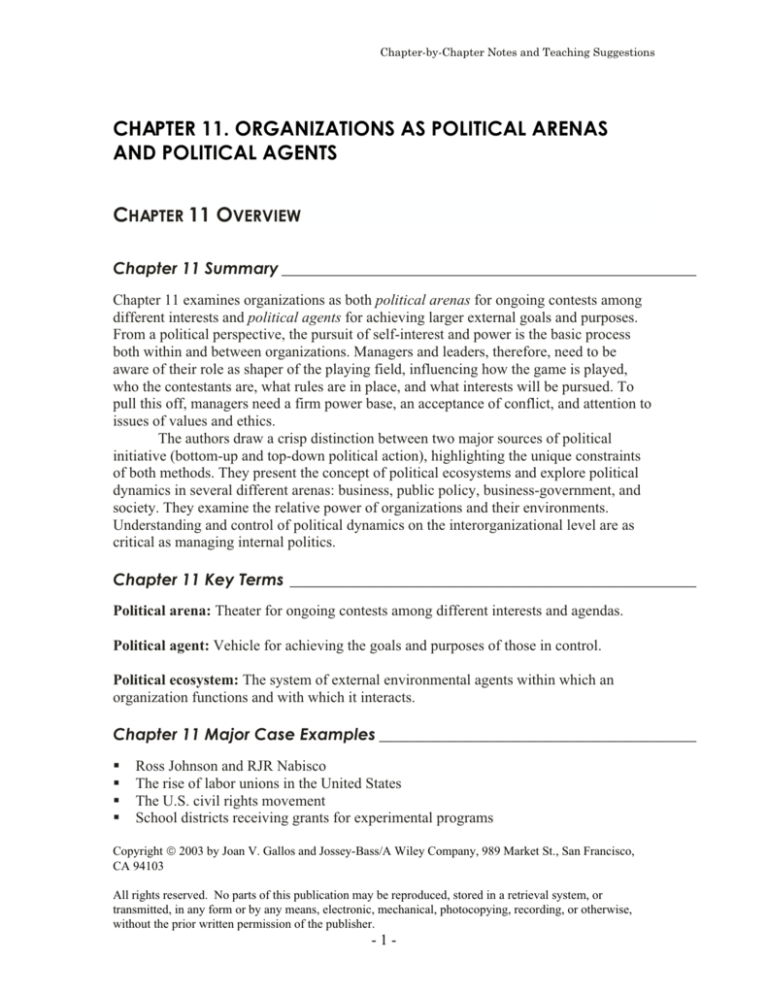
Chapter-by-Chapter Notes and Teaching Suggestions
CHAPTER 11. ORGANIZATIONS AS POLITICAL ARENAS
AND POLITICAL AGENTS
CHAPTER 11 OVERVIEW
Chapter 11 Summary ___________________________________________________
Chapter 11 examines organizations as both political arenas for ongoing contests among
different interests and political agents for achieving larger external goals and purposes.
From a political perspective, the pursuit of self-interest and power is the basic process
both within and between organizations. Managers and leaders, therefore, need to be
aware of their role as shaper of the playing field, influencing how the game is played,
who the contestants are, what rules are in place, and what interests will be pursued. To
pull this off, managers need a firm power base, an acceptance of conflict, and attention to
issues of values and ethics.
The authors draw a crisp distinction between two major sources of political
initiative (bottom-up and top-down political action), highlighting the unique constraints
of both methods. They present the concept of political ecosystems and explore political
dynamics in several different arenas: business, public policy, business-government, and
society. They examine the relative power of organizations and their environments.
Understanding and control of political dynamics on the interorganizational level are as
critical as managing internal politics.
Chapter 11 Key Terms __________________________________________________
Political arena: Theater for ongoing contests among different interests and agendas.
Political agent: Vehicle for achieving the goals and purposes of those in control.
Political ecosystem: The system of external environmental agents within which an
organization functions and with which it interacts.
Chapter 11 Major Case Examples _______________________________________
Ross Johnson and RJR Nabisco
The rise of labor unions in the United States
The U.S. civil rights movement
School districts receiving grants for experimental programs
Copyright 2003 by Joan V. Gallos and Jossey-Bass/A Wiley Company, 989 Market St., San Francisco,
CA 94103
All rights reserved. No parts of this publication may be reproduced, stored in a retrieval system, or
transmitted, in any form or by any means, electronic, mechanical, photocopying, recording, or otherwise,
without the prior written permission of the publisher.
-1-
Chapter-by-Chapter Notes and Teaching Suggestions
Apple & IBM
General Motors
Jack Welch and General Electric
The U.S. Federal Aviation Administration
Pharmaceutical companies, physicians, managed health care providers, and
government
Federal Express revisited
Jihad & McWorld
SUGGESTIONS FOR TEACHING CHAPTER 11
Chapter 11 emphasizes that organizations are political arenas, as well as major political
players in the global marketplace. Instructors can use this chapter to:
Focus on understanding political processes within organizations, reinforcing students’
ability to feel politically competent.
2. Explore organizations as political agents that shape the broader social, economic, or
political context.
1.
Teaching methods appropriate for each approach are described in the sections that follow.
Student exercises keyed to the approaches appear in “Student Exercises for Chapter 11,”
beginning on page 7.
Chapter 11: A Focus on Political Competence ___________________________
Although students may think they understand political dynamics, many are ill equipped
to influence what happens on the political playing field. This chapter can strengthen
connections between knowledge of politics and effective political action. Many of the
ideas in the teaching notes for Chapters 9 and 10 can help in connecting ideas to action.
One thing instructors might want to do is help students come to terms with their
overall comfort with the political frame. Students with little experience in positive
politics are often skeptical that political diagnosis and action are good things. Students
generally will participate with gusto in a general discussion of these issues and of the
ethical implications of political choices. Instructors can also structure a debate between
advocates and critics of the political frame or weave issues of variations in student
comfort with political thinking into examinations, assignments, or study questions.
Chapter 11: Cases Focusing on Political Competence
Students who feel overwhelmed or confused by political forces can become more
competent by learning simple ways to sort through the jungle. They can learn how to
identify key stakeholders and their interests, to assess how much and what kinds of power
each have, and to anticipate their preferred outcomes. Cases can be helpful.
Copyright 2003 by Joan V. Gallos and Jossey-Bass/A Wiley Company, 989 Market St., San Francisco,
CA 94103
All rights reserved. No parts of this publication may be reproduced, stored in a retrieval system, or
transmitted, in any form or by any means, electronic, mechanical, photocopying, recording, or otherwise,
without the prior written permission of the publisher.
-2-
Chapter-by-Chapter Notes and Teaching Suggestions
West Point: The Cheating Incident ([A] [HBS 9-481-117] and [C] [HBS 9-482-006])
offers one possibility. Instructors who have already drilled diagnostic skills using
West Point (or another case) may want to return to the case to identify the steps in
political strategizing: What do you do after you size up the lay of the land? How can
effective leaders use their diagnosis to develop an effective plan? In small or large
groups, instructors can ask students to suggest what General Berry can do to influence
and redirect the political forces he faces. How can he shift the key players in the
situation? Alter the balance of power? Empower himself further? Define or amend the
rules of the game? Strengthen his interests? Build his coalitions? and so on. Both
naive and cynical students can experience a revelation in seeing that one does not
have to passively accept the political status quo. Good managers and leaders use a
variety of strategies to influence the political game.
Other cases that could be used with a similar teaching goal include the following:
The Cleveland School Voucher Program: A Question of Choice ([A] [KSG 1509] and
[B] [1510]) focuses on the challenges facing the director of Cleveland’s politically
controversial voucher program.
A Day’s Work for a Day’s Wages: Boosting Worker Productivity in New York’s
Department of Sanitation (KSG 1495.0 and 1495.1) chronicles an initiative to
persuade or force New York City’s sanitation workers to increase their productivity.
Building Products International: A Crisis Management Strategy ([A] [Ivey 99C001],
[B] [99C002], [C] [99C003], and teaching note 899C01; also available through HBS)
is set in Indonesia in 1998. Under chaotic conditions and the threat of serious physical
danger, BPI’s human resource manager faces critical problems concerning how,
when, and whom to evacuate. The three cases move through a complex, ambiguous,
rapidly deteriorating scenario and, in case C, to post-crisis politics as the key decision
maker’s actions are subject to review and criticism.
Aston-Blair, Inc. (HBS 9-494-015) describes the many challenges encountered by the
manager of an interdepartmental task force. A good example of the political situations
facing middle managers.
Chapter 11: Activities Focusing on Political Competence
An alternative teaching focus is to provide opportunities for students to diagnose their
own political skills. One idea is presented as Exercise 11.1. In addition, discussion of
strategies available to key figures in one of the cases suggested in the teaching notes for
Chapter 9 or 10, data from in-class role plays based on one of these cases, and selfassessment of behavior in a power simulation, augmented with examples from classroom
or group experiences, can add up to a solid basis for self-diagnostic work.
Copyright 2003 by Joan V. Gallos and Jossey-Bass/A Wiley Company, 989 Market St., San Francisco,
CA 94103
All rights reserved. No parts of this publication may be reproduced, stored in a retrieval system, or
transmitted, in any form or by any means, electronic, mechanical, photocopying, recording, or otherwise,
without the prior written permission of the publisher.
-3-
Chapter-by-Chapter Notes and Teaching Suggestions
Negotiation simulations provide one vehicle for this sort of work. A good
source of readings and exercises for negotiation simulations is Negotiations:
Readings, Exercises, and Cases, 4th ed., by Roy Lewicke, David Saunders,
Bruce Barry, and John Minton (McGraw-Hill, 2002). The two examples that
follow offer additional possibilities.
Conoco’s Green Oil Strategy ([A] [HBS 9-392-133], teaching note 5-393-021])
describes the company’s efforts to develop an environmentally sound and politically
viable strategy for an oil development in Ecuador. A series of supplements (Block 16:
Ecuadorean Government’s Perspective, 9-394-002; Block 16: Environmental Groups’
Perspective, 9-394-004; Block 16: Indigenous People’s Perspective, 9-394-003; and
Block 16: Management’s Perspective, 9-394-075) provide guidelines for role-playing
a simulation built around the case.
Negotiating Peace Accords in Bellicoso (HBS 9-899-087 etc.) provides a series of
role instructions for the parties to peace negotiations in the fictitious Latin American
nation of Bellicoso (the scenario is patterned loosely after the civil war in El
Salvador). In the context of a right-wing military government, leftist guerillas, chaos,
kidnappings, and violence, can the participants find their way to a peace agreement
with the help of U.N. mediators?
Chapter 11: A Focus on Ecosystems and
Organizations as Political Players________________________________________
Exploring organizations as political players in contested ecosystems can move students
from a focus on internal politics into a larger world of political dynamics in the external
environment.
Chapter 11: Reading Focusing on Ecosystems and
Organizations as Political Players
Readings from James F. Moore’s The Death of Competition: Leadership and Strategy
in the Age of Business Ecosystems (John Wiley & Sons, 1999) will deepen students’
understanding of the ecological metaphor. (Chapters 1 and 2 in Moore’s book provide
a good introduction to these ideas; Chapter 5 applies them to the automobile
industry.)
Students might also search newspapers or periodicals for articles about organizations
as global political agents responding to complex environmental forces.
An alternative twist is to examine ways in which ideas about organizations affect
relationships between nations. Instructors might want students to read all or part of R.
L. Kahn and M. N. Zald’s Organizations and Nation-States: New Perspectives on
Copyright 2003 by Joan V. Gallos and Jossey-Bass/A Wiley Company, 989 Market St., San Francisco,
CA 94103
All rights reserved. No parts of this publication may be reproduced, stored in a retrieval system, or
transmitted, in any form or by any means, electronic, mechanical, photocopying, recording, or otherwise,
without the prior written permission of the publisher.
-4-
Chapter-by-Chapter Notes and Teaching Suggestions
Conflict and Cooperation (San Francisco: Jossey-Bass, 1990) to explore not only
what international relations teaches us about important organizational processes but
also how organizational theory and behavior—which make up a relatively new and
primarily U.S.–generated body of knowledge—inform the thinking of key world
leaders.
The 2003 U.S. invasion of Iraq, the earlier Persian Gulf War between Iraq and a
United States–led coalition, and ever-shifting Middle Eastern affairs are ripe with
possibilities for exploring the implications of conflicting, culturally specific, nationcentered political beliefs and processes. Instructors can use Kahn and Zald’s
Organizations and Nation-States to examine the applicability and adaptability of OB
and successful corporate strategies for cooperation and conflict management in the
Middle East. Contrasts can be developed between Western perspectives and Sun
Tzu’s classic Eastern perspective in The Art of War (available in numerous editions).
The failure of negotiations between Iraq and the United States–led coalition
preceding the Gulf War can be explored using Fisher and Ury’s Getting to Yes:
Negotiating Agreement Without Giving In (Boston: Houghton Mifflin, 1992) as a
supplemental reading. (Instructors using the Fisher and Ury model should see the
examination of issues in the Persian Gulf by Fisher and others from the Harvard
Negotiation Project in the Boston Globe, February 8, 1991, p. 15.)
Chapter 11: Cases Focusing on Ecosystems and
Organizations as Political Players
Instructors can also assign relevant cases, such as the following:
Corning Glass: International ([A] (HBS 9-381-160], [B1] [HBS 9-381-16], [B2]
[HBS 9-381-162], [C1] [HBS 9-381-163], [C2] [HBS 9-381-164], and [D] [HBS 9381-112]) offers a glimpse into corporate strategy and managerial thinking in
corporate world players. The Corning Glass: International case series comes with two
videotapes: Part 1 (HBS 9-882-512) contains interviews with middle management;
Part 2 (HBS 9-882-513) contains interviews with top management.
Kellogg Co.: Sugar, Children, and TV Advertising (HBS 9-380-078) and Kellogg
Co.: Sugar, Children, and TV—A Postscript (HBS unnumbered) examine the
increasing incidence of shareholder resolutions on social issues.
Discussing Disaster: The Tuen Mun Highway Traffic Jam of September 1995 ([A]
[KSG 1433.0]) tells the story of Hong Kong’s most catastrophic traffic jam. A series
of decisions by several different agencies unintentionally helped to set the stage for a
political crisis, and one transportation official’s comments made things worse.
Mike Pertschuk and the Federal Trade Commission (KSG C16-81-387A) explores
political dynamics involving Pertschuk (as a new, pro-consumer chair of the FTC)
and other relevant constituents, such as Congress, the media, and business.
Copyright 2003 by Joan V. Gallos and Jossey-Bass/A Wiley Company, 989 Market St., San Francisco,
CA 94103
All rights reserved. No parts of this publication may be reproduced, stored in a retrieval system, or
transmitted, in any form or by any means, electronic, mechanical, photocopying, recording, or otherwise,
without the prior written permission of the publisher.
-5-
Chapter-by-Chapter Notes and Teaching Suggestions
Life, Death, and Property Rights: The Pharmaceutical Industry Faces AIDS in Africa
([HBS 9-702-049], [Phase Two] [HBS 9-703-005], and teaching note HBS 5-703047). Pharmaceutical companies developed expensive new medicines that helped
bring AIDS under control in wealthy nations but had little impact in poor countries,
particularly Africa, where millions of people have the disease. How should the
companies respond to pressure to cut prices or even give the drugs away?
Hitting the Wall: Nike and International Labor Practices (HBS 9-700-047). Nike’s
enormous success was threatened in the 1990s by charges that the company had built
its success partly on the backs of underpaid, exploited workers in its overseas plants.
Nike denied the charges, but activists kept up the pressure.
Seattle Public Schools—1995–2002: Race, Class, and School Choice ([C1] [HBS 9803-039] and [C2] [HBS 9-803-040]) describes an initiative to replace mandatory
busing as a desegregation tool with a school choice program. Cases C1 and C2 are
part of a series of cases dealing with a major effort to transform the Seattle public
schools (others are described in the notes for Chapter 17; see “Chapter 17: Cases
Focusing on Four-Frame Leadership”).
A Time of Reckoning: Crisis in the Buffalo Public School System ([Abridged] [KSG
1406.3], [Epilogue] [KSG 1406.4], and teaching note 1406.2) describes how a series
of historical, political, cultural, and managerial issues led to the potential bankruptcy
of the Buffalo, New York, public school system in the face of a court-ordered backpay settlement with its teachers’ union. Issues include leadership style and decisions,
labor relations, and conflict among many players (superintendent, union, board, city
government, and so forth).
Zero Tolerance in Memphis ([A] [KSG 1438.0], [B] [KSG1439.0], and teaching note
1438.2) chronicles challenges facing a new superintendent of schools in Memphis
who believes the schools have put too much emphasis on discipline and too little on
learning. The school board and teachers’ union are both committed to a policy of
“zero tolerance” for assaults on teachers. What the policy means and how it should be
implemented become a major challenge for the superintendent.
In Pushing the Boundaries: Redistricting the Kentwood Schools (KSG 1437.0,
teaching note 1437.2), the superintendent of a suburban school district in Michigan
looks for a politically viable way to redraw school district boundaries to ensure that
minority and special needs students are distributed across the district rather than
concentrated in a few schools.
A number of cases explore ethical questions concerning corporate strategies for
securing foreign markets:
Copyright 2003 by Joan V. Gallos and Jossey-Bass/A Wiley Company, 989 Market St., San Francisco,
CA 94103
All rights reserved. No parts of this publication may be reproduced, stored in a retrieval system, or
transmitted, in any form or by any means, electronic, mechanical, photocopying, recording, or otherwise,
without the prior written permission of the publisher.
-6-
Chapter-by-Chapter Notes and Teaching Suggestions
º
º
º
º
Note on the Export of Pesticides from the United States to Developing Countries
(HBS 384-097).
Questionable Payments Abroad: Gulf in Italy (HBS 9-382-080).
Nestle Alimentana S.A.—Infant Formula (HBS 9-580-118).
Bribery and Extortion in International Business (HBS 9-380-087).
Chapter 11: Films or Videos Focusing on Ecosystems and
Organizations as Political Players
Barbarians at the Gate, a 1993 HBO film starring James Garner as Ross Johnson,
provides a dramatic reenactment of the RJR Nabisco LBO discussed in the chapter.
(The film is available from http://www.amazon.com/ and elsewhere in both VHS and
DVD.)
STUDENT EXERCISES FOR CHAPTER 11
EXERCISE 11.1 ________________________________________________________________
Focus: Political Competence
Have students write personal minicases that describe their best and their worst
experiences in applying political skills. Then, in pairs or small groups, have them
compare their cases. Based on these discussions, they are to create lists of their political
strengths and “Achilles’ heels.”
Copyright 2003 by Joan V. Gallos and Jossey-Bass/A Wiley Company, 989 Market St., San Francisco,
CA 94103
All rights reserved. No parts of this publication may be reproduced, stored in a retrieval system, or
transmitted, in any form or by any means, electronic, mechanical, photocopying, recording, or otherwise,
without the prior written permission of the publisher.
-7-

